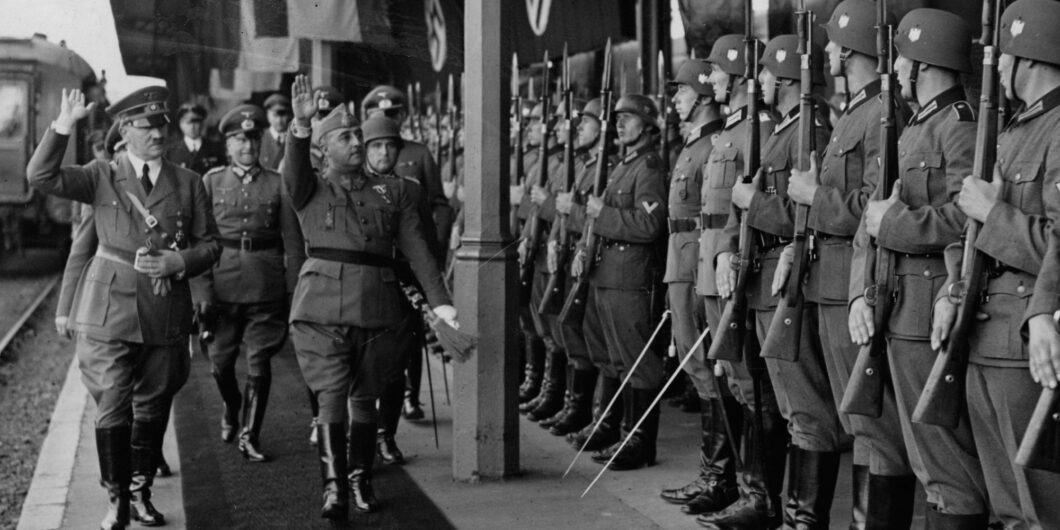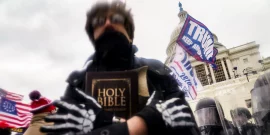Our particular national character, as Burke could see even before American independence, is uniquely oriented by certain principled commitments.
The Absurdity of a "Protestant Franco"
Joshua Abbotoy recently pondered in First Things whether a “Protestant Franco” is inevitable for the United States. The managing director of New Founding and Executive Director of the American Reformer, Abbotoy is no marginal figure but an important voice who shows that Christian Nationalism is growing within the traditional Protestant intellectual world. His argument is simple: republican conditions in the United States are in worse shape than they were even during the years leading up to the American Civil War. Under these conditions, fidelity to the Constitution spells doom for believers surrounded by existential threats. In the event these threats worsen (and at the very least, there is no reason to think they will recede), the only alternative is a “Protestant Franco” to return the nation to order. Such a notion might strike the reader as very strange. For the unfamiliar, a “Protestant Franco” is a dictator who serves as an avenging strongman who punishes liberals for their injustice and restores a Christian order directly through his personal rule.
This argument, of course, is very bad, but it is useful for revealing the frame of mind in which Christian Nationalists and other illiberal religious thinkers perceive the world. Those who might be enticed by such an argument ought to recognize the absurdity of the very concept of a “Protestant Franco,” the tyranny and failure of the historical Franco regime, and the self-radicalized derangement that so many illiberal religious thinkers find themselves experiencing.
As I joked in a podcast earlier this year, the person who would be most horrified at the idea of a “Protestant Franco” would have been El Caudillo por la Gracia de Dios himself. El Franquismo as an ideology was a combination of Catholic integralism, right-wing Carlism (a monarchist party seeking to restore a Bourbon descendent from the line of Don Carlos, Count of Molina), and a Spanish version of fascism called Falangism. The first two elements are expressly Catholic: integralism provided a model of Church cooperation with the state and Carlism provided the ultimate goal of restoring a Catholic monarchy. Falangism was the means of restoration, as it provided the organized military dictatorship necessary to combat the enemies of the throne and altar.
Franco’s legitimacy rested on him being El Caudillo por la Gracia de Dios—the Leader by the Grace of God. Conferring this status was a captive Catholic hierarchy stuck between extermination by the Republicans and submission to Franco. Some were true believers in El Caudillo, but not all. Regardless of the personal opinions of clergy, Franco relied on the blessing of an external, visible Church and regular appearances at Catholic Masses and other ceremonies that emphasized his role as a temporal ruler defending the Catholic Church. The Church had a monopoly on spiritual matters, meaning that Protestants in Spain—unless they were foreigners of some standing—were exposed to considerable risk in practicing their faith.
It is not clear that most varieties of Protestantism could countenance this approach because of the very nature of most Protestant faiths. The closest example one might find is in, perhaps, the long reign of Queen Elizabeth I, who used her supposed authority as the spiritual and temporal sovereign over her realm to hunt down Catholic clergy and laity alike. Another example might be the Kulturkampf of Otto von Bismarck, who wished to wrest Catholics away from their religious institutions and force them into state-run alternatives.
These examples are far removed from the American experience. During the colonial years, establishments fought tooth and nail to retain their monopoly status, but theirs was a losing battle. The strongest case was that of the Massachusetts Puritans, and they went from the Half-Way Covenant of the 1660s to the dissolution of their establishment in 1833. They governed without Ye Olde Sovereigne Chusen by God. Instead, they operated under associations of church members and, eventually citizens of the Commonwealth. Indeed, Puritan political theology seemed to forbid the idea of a “Protestant Franco” altogether, given that the true sovereign over Church and state was God Himself. Reformed ecclesiology rejected episcopal hierarchy in favor of a more “republican” selection, such as by church elders. Puritan co-religionists remaining in England would fight the English Civil War in defense of parliamentary supremacy during the mid-seventeenth century. The Reformed influence on English republicanism was still strong enough for King George III to agree with his advisor, Sir William Jones, that the American Revolution was a “Presbyterian War.”
As for colonial Anglicans, they relied on overseas administration since they lacked a bishop. One major cause (among many) for New England’s agitation against the British government was the fear that the Crown might appoint such a bishop. Hence, the experience of a strong Anglican establishment was muted, although Baptist evangelists were often jailed for preaching in Anglican territory. Of course, Baptists were the major force for religious disestablishment, as found in the forceful argumentation of Isaac Backus. There is no fertile ground there.
Franco had drunk deeply of reactionary Catholic narratives that vindicated the throne and altar as innocent victims betrayed by foreign powers.
Scripture itself seems to recommend against a “Protestant Franco.” It was such a figure who enslaved the Israelites in Egypt, and he was laid low by the one and true God. Moses lacked full authority, as he was a temporal leader, and Aaron the chief priest. The golden age of Israel is one in which the tribes governed themselves, and the end of this golden age comes with the establishment of a monarch. In I Samuel 8, God says, “And the Lord said unto Samuel, Hearken unto the voice of the people in all that they say unto thee: for they have not rejected thee, but they have rejected me, that I should not reign over them.” If the people of Israel wanted a king, then they would get one good and hard, as Samuel prophesies:
And Samuel told all the words of the Lord unto the people that asked of him a king. And he said, This will be the manner of the king that shall reign over you: He will take your sons, and appoint them for himself, for his chariots, and to be his horsemen; and some shall run before his chariots.
The passage continues at length in detailing the fate that would befall Israel, and the Bible recounts precisely this outcome until ultimately the Southern remnant is exiled to Babylon. No wonder, then, Psalm 146:1–5 implores:
Put not your trust in princes, nor in the son of man, in whom there is no help.
His breath goeth forth, he returneth to his earth; in that very day his thoughts perish.
Happy is he that hath the God of Jacob for his help, whose hope is in the LORD his God.
Abbotoy seems to think that a “Protestant Franco” would be restorative for conservatives who are left with no other option, but Franco was a cause of tremendous frustration even for those who saw in him the possibility of restoring a stable Catholic monarchy. The reasons for Franco’s failure are very dark.
During the years he spent aligned with the Axis Powers, Franco understood his enemies not only to be the Spanish Republicans who had started the crisis leading the Spanish Civil War, but also a “Judeo-Masonic-Bolshevik” conspiracy that he believed was one of the root causes of the crisis. Spain had a long history of suspicion of foreign influence, stemming from the Inquisition questioning the genuineness of formerly Jewish and Muslim converts. Converted Jews, or “conversos,” experienced considerable prejudice and suspicion, but the converted Muslims, or “moriscos,” were subject to a lengthy purge from Spain altogether in the early 1600s with fear of their continued presence lasting into the eighteenth century.
Declining fear of morsicos shifted to suspicion of the Masonic Lodge in Spain, which intensified after the French Revolution. Monarchists sought to vindicate the ancien régime by blaming Jews and Freemasons and, once they became a force, communists. The development of these narratives began with Abbé Barruel, Félix Sardà y Salvany, Louis Veuillot, Charles Maurras, and Fr. Julio Meinvielle. Franco had drunk deeply of reactionary Catholic narratives that vindicated the throne and altar as innocent victims betrayed by foreign powers, and those closest to him shared belief in those conspiracies. Franco regarded his foes in the Spanish Republican Army as part of this conspiracy and would suppress Masonic Lodges. And as Paul Preston recently demonstrated, he engaged in fiercely antisemitic practices, the knowledge of which his post-war propaganda efforts sought to suppress. Franco, according to Preston, regarded The Protocols of the Elders of Zion as real history.
After the war, Franco oversaw a failed autarky that impoverished and isolated the country from the rest of Europe. By the combined efforts of propaganda and the generous use of state violence, he was able to preserve his control. Franco’s advancing age loosened his grip on power, as did the desire of many Spanish to integrate into the postwar democratic West. Only in 1959, with the imposition of the Plan de Estabilización, was the Falangist corporatism ended in favor of freer trade and openness to investment. Soon after, he began to liberalize his regime, delegating his authority to advisers and watching hours and hours of soccer. God blessed Franco with a long life, but this blessing was a curse on Spain, whose people were resigned to awaiting his death in the hope that whatever came next would be better. Thankfully, it was. Upon his death on November 20, 1975, Franco was succeeded by King Juan Carlos, who immediately began to transition Spain not into a centralized Catholic monarchy but a liberal democracy. The Catholic Church in Spain to this day remains moribund, Her churches empty and graveyards full. Using the idiom of his present-day American admirers, one is tempted to ask what Franco’s conservatism conserved?
An examination of Abbotoy’s rhetoric reveals a kind of self-radicalization. He opens his argument by entering into evidence an overheated description of the present:
American conservatives know things are bad. Our Constitution is stretched to the breaking point. Contested elections, failures to pass a federal budget, impeachments, talk of packing the Supreme Court, emerging fights between states about extradition, politicized persecution of dissidents, and many other such strains all reveal the U.S. to be a schizophrenic state, divided by incompatible visions of justice and the good life.
Abbotoy seems unaware that this kind of dysfunction is the status quo for American government. The Constitution, though not rightly heeded, is far from a breaking point, and the failure to heed the Constitution is hardly new. It has been, rather, a constant since its ratification. Look only to the debates over the Alien and Sedition Acts, attacks on the First Bank of the United States, the Tariff of Abominations, Indian Removal, the Mexican-American War, the Annexation of Texas, the Compromise of 1850, Dred Scott, the Utah War of 1858, the American Civil War, the first Ku Klux Klan, the Devil’s Bargain of 1877, Jim Crow, Indian Wars, the economic Depression of the 1880s, the Populist Revolt, Plessy v. Ferguson, the Robber Barons, Buck v. Bell, the entire second Wilson Administration, the second Ku Klux Klan, the Great Depression, widespread lynching of African Americans, Japanese internment, Roosevelt’s court packing, Wickard v. Filburn, the Dixiecrat Revolt of 1948, the rise of the administrative state, and the list goes on and on. There was never a period in American history without seemingly insurmountable moral and ethical problems that threatened to consume the Constitution. Yet we have surmounted them by maintaining fidelity to the Constitution. Never did it require a “Protestant Franco.”
Abbotoy says, “Reciprocal participation in the republican process has broken down, imperiling the government’s ability to secure basic goods such as order and security. Any regime that fails to provide such basic goods has a limited shelf life.” The appropriate response should be: “You must be new here.” The United States regularly experiences national crises and tragedies, and our republican institutions have served us well enough to handle them. By no means are they perfect, but they are much better than Franco’s.
The United States does not need a paranoid, antisemitic dictator to force Americans into poverty with propaganda and secret police. There is nothing in 1930s Spain that can instruct Americans about their Constitutional order. Spain had never recovered from the French Revolution, and its decline into fights over true sovereignty reflected a complete collapse in civic virtue. To call for a “Protestant Franco” is to call for a surrender of civic virtue in the name of vengeance against one’s enemies. The result under Franco was like that prophesied by Samuel: a nation despoiled. Samuel warned, “And ye shall cry out in that day because of your king which ye shall have chosen you; and the Lord will not hear you in that day.” It seems like the Psalmist was right.



